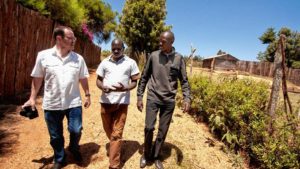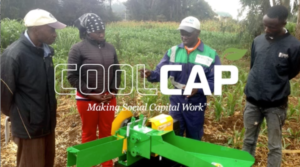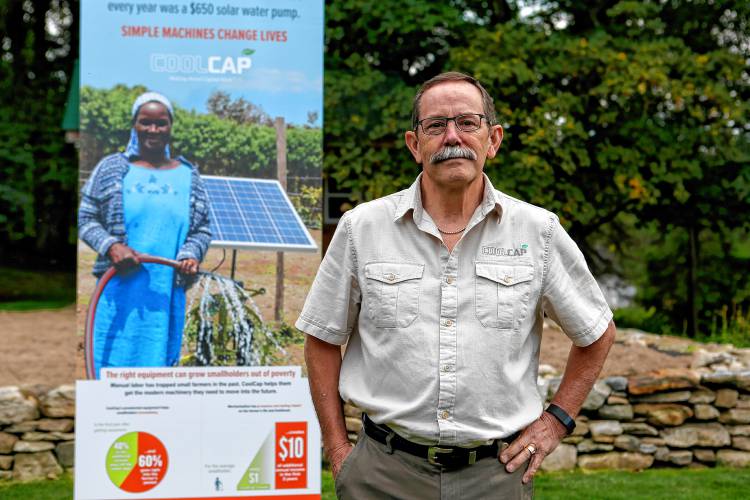Daily Hampshire Gazette
By SCOTT MERZBACH
Staff Writer
Monday, September 04, 2017
AMHERST MA LEVERETT MA
LEVERETT — American farms often feature many acres and several pieces of gas-powered equipment, all put to use to increase efficiency for the farmer and maximize crop production.
For those working the land in Kenya and other sub-Saharan nations, though, farming is not nearly as modern. In these lands, farmers still rely on hand-held implements — like hoes and machetes — that make the enterprise more time-consuming and labor intensive, even though these small farms, typically averaging 2½ acres, are the sole source of income for families.
To address this inequity and enhance food production and incomes in Kenya, a Leverett man has created a company called CoolCap Fund that aims to break the cycle of challenges these farmers face, getting them the necessary machinery to enhance their livelihood and better their lives.
 The company does this by loaning money to farmers for equipment and other needs through a “pay-as-you-harvest” system in which the company partners with food wholesalers in Kenya and other African countries who purchase crops directly with farmers there. Repayment for equipment is tied to harvests and not monthly payments.
The company does this by loaning money to farmers for equipment and other needs through a “pay-as-you-harvest” system in which the company partners with food wholesalers in Kenya and other African countries who purchase crops directly with farmers there. Repayment for equipment is tied to harvests and not monthly payments.
“This will help more farmers out of poverty by offering them equipment they couldn’t otherwise afford,” CoolCap founder Roger Bird said. “It gives them hope for the future.”
He points to one Kenyan dairy farmer who spends four to six hours in the field chopping the grass that is needed to feed his dairy cows. By providing this farmer a feed pulverizer, at a cost of just $720, the farmer can complete the same process in an hour. But, Bird said, it not only reduces the amount of time spent on the work, it also has the added benefit of making the cows more productive and increases the quality of the milk.
“Production capacity is exponential when we’re talking about small, productive and affordable equipment,” Bird said.
Bird said he heard repeatedly from Kenyan farmers, trained through United Nations and United States Agency for International Development, among other programs, of their equipment needs.
“What good does it do train me with this technology if I can’t buy it” was a common refrain, Bird said.
 CoolCap completed its first loan in May, working with LishaBora, a company on the ground in Kiambu, Kenya, that sells dry feed and provides services to smallholder dairy farmers. This loan was used to obtain a $3,000 feed chopper that 200 farmers will use. The silage produced through this chopper will provide for their dairy cows, doing the same amount of work in less than a quarter of the time.
CoolCap completed its first loan in May, working with LishaBora, a company on the ground in Kiambu, Kenya, that sells dry feed and provides services to smallholder dairy farmers. This loan was used to obtain a $3,000 feed chopper that 200 farmers will use. The silage produced through this chopper will provide for their dairy cows, doing the same amount of work in less than a quarter of the time.
Farmers who grow maize, rice and beans, and even some in specialized crops that take aim at a global demand, such as passion fruit, can also benefit from CoolCap’s work.
When Bird launched the 501C3 nonprofit, as well as organizing a for-profit entity registered in Kenya, he came up with the idea of what he calls “pay as you harvest,” which creates a sustainable process that, unlike a gift would do, continually reinvests money from CoolCap.
Bird explains that the company’s name describes his intent, with “cool” showing an expression of patience, and “cap,” referencing the money.
“We are patient capital,” Bird said.
Bird said no one else has been willing to finance in a similar way. Traditional banks, microfinanciers and lending institutions require regular repayments from the farmers, meaning they are looking for people with steady income. This means just 3 percent of the small farmers, who make up 90 percent of all farmers in Kenya, are actually receiving loans.
But farming, by its nature, is not that consistent, and can depend on factors such as weather, pests and even conflict.
CoolCap reaches farmers through their wholesale buyers, who bring the produce to market. These buyers also provide the seed and other inputs and work closely with the farmers. They are able to deduct from the regular payment the repayment of the loan that allows the “pay as you harvest” system to work.
“We come in and offer financing directly to the farmer,” Bird said “This gives us the ability to reach them at the point of sale, which others can’t do.”
It also means building a relationship that allows CoolCap to be confident in knowing who is a reliable farmer, and who doesn’t have integrity, based on harvests and sales.
“We are able to evaluate farmers based on historical production and their relationship with wholesalers,” Bird said.
The agreements with wholesale buyers in Kenya, and equipment providers like LishaBora, allows for the sustainable process to be in place, despite the fact that many farmers have no electricity or running water in their homes.
A rich background
Bird brings more than 20 years of experience in international donor projects, as well as 35 years in the banking and financial world, starting with lending in Washington state.
This gives him an understanding of how to increase the farmers’ access to credit, recognizing that economic support through donations and other funding organizations has, so far, had limited ability in increasing credit.
Bird is continuing to seek private fundraising related to the first loan.
“Now we’re out fundraising for more to continue to scale our operation,” Bird said.
Other machines he anticipates providing farmers include rototillers, with farmers doing about half of the land tilling with hoes, and solar powered water pumps to help irrigate.
Bird said he hopes to expand to east African countries, and notes there have already been inquiries from Central America. It is a scalable project to agriculture anywhere in the world.
“People are hoping for knowledge, and to improve their lives,” Bird said. “It’s very rewarding.”
People can get involved by making donations through CoolCap’s website. Bird said he also is making presentations about his business locally, including a recent talk at the Unitarian Universalist Society in Amherst.

